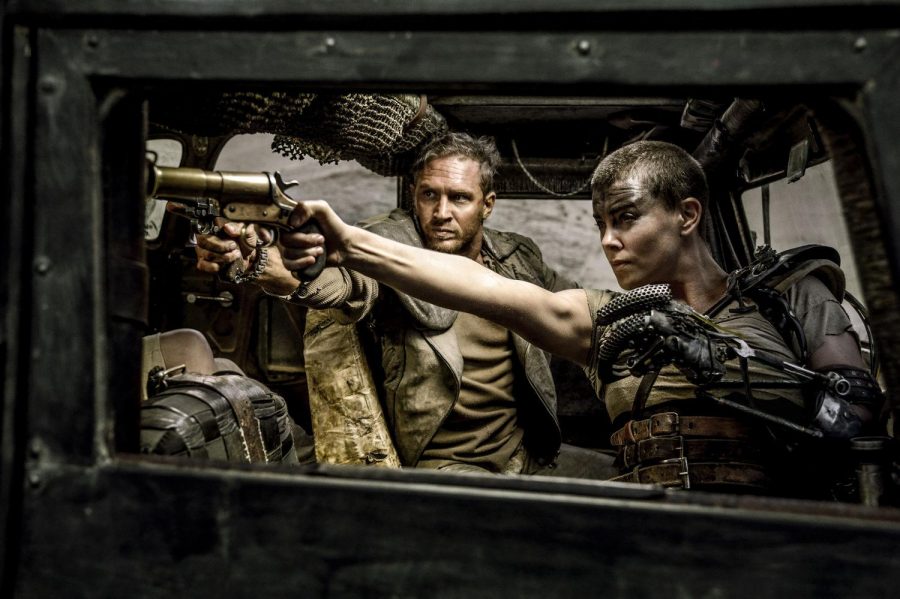“Mad Max: Fury Road” is everything an action movie should be
May 14, 2015
“Mad Max: Fury Road”
Directed By: George Miller
Starring: Tom Hardy, Charlize Theron, Nicholas Hoult
Grade: A+
Move over, Michael Bay, because George Miller is back, and he brought a set of defibrillators.
After working on “Mad Max: Fury Road” formore than a decade, Miller gives the action genre a much-needed return to its pulse-pounding roots. His grip hasn’t faltered, which is impressive considering his other memorable credits are “Babe: Pig in the City” and the “Happy Feet” films. For Miller, directing a “Mad Max” film is like riding a bike, but with guns.
In Miller’s latest, Mad Max Rockatansky (Tom Hardy) is on the run in the Australian wasteland from the starving living and the dead of his past, who come to him in hallucinations. He clashes with a raiding party that brings him to the Citadel, home of a cult-like people who worship the warlord Immortan Joe (Hugh Keays-Byrne), an aged leader with an assisted breathing apparatus. Joe’s prized warrior, Imperator Furiosa (Charlize Theron), betrays Joe when she smuggles his wives out of the Citadel in her war rig (a multi-sectioned truck with spiked wheels and hidden weapons), with the claim that they are not “breeding property.” Max weighs the benefits and eventually joins her crusade out of necessity, for survival. Also along for the ride is Nux (Nicholas Hoult), one of Joe’s soldiers stowed away on the war rig, who switches allegiances halfway down the road.
Miller keeps the great parts of ‘80s action and trims the fat from modern-day action flicks — fat so abundant that it makes up most of the genre, from unrealistic stunts (sideways glance at the “Fast & Furious” franchise) to an over-reliance on computer graphics (blatant stare at “Transformers” and “The Hobbit”). Miller focused heavily on practical effects, reserving CGI for erasing stunt-wires and creating sandstorms. Miller’s stunt team even created its owntechnique and equipment to flip cars.
Miller’s personal touch can be seen in the smallest details, like a split-second flash of white across the screen when a character is head-butted. Some sequences suffer from a severe case of shaky cam, but it’s usually due to Max’s disorientation or the fact that he’s fighting on top of a flaming semi-truck.
Miller includes several nods to the original film, especially in Max’s iconic leather attire and classic Interceptor. It’s as if the ending of “Mad Max 2: The Road Warrior” was stretched to over two hours with a nearly non-stop chase scene. Another theme in keeping with the originals is Max’s bystander status, where he seems to witness the events of the wasteland as opposed to causing them.
Hardy gives a relatable performance as Max, with dialogue consisting mostly of grunts and monosyllabic responses, while his longer lines are reminiscent of Bane from “The Dark Knight Rises.” Theron is as fierce as ever, especially with a robot arm. Keays-Byrne’s performance behind the mask may be even more memorable than his role as the crazed Toecutter in the original movie. Hoult’s Nux adds a certain dynamic of hope not really seen in the other characters. Characters are introduced quickly, with little backstory coming later.
“Fury Road” is not an action movie — it’s a nitro-fueled dystopian opera with a score to match. Nux uses Max as a human hood ornament. A neighboring warlord has a wig made of ammunition magazines and a bullet for a false tooth. One Rider plays an electric guitar that doubles as a flame-thrower aboard a post-apocalyptic rock-n-roll parade float. War Boys board vehicles using 15-foot pole-vaults atop high-speed cars and huff spray paint like inhalers when wounded.
Mad Max is the most metal movie of the year. Guaranteed.



